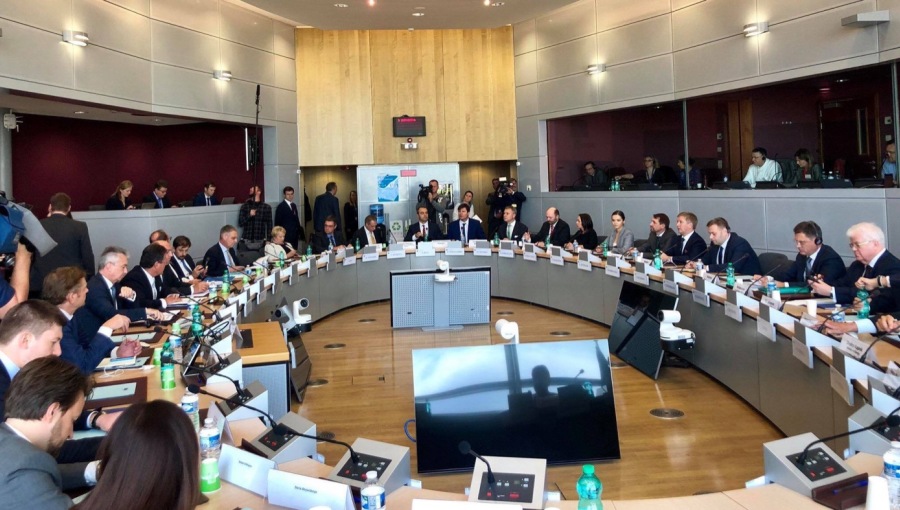Latest Russia-Ukraine gas talks fail to yield breakthrough

Officials from Russia, Ukraine and the EU met again on October 28in Brussels to discuss terms for the transit of Russian gas via Ukraine next year, with still no breakthrough in negotiations in sight.
Ukraine is the largest single transit route for Russian gas entering Europe, handling 86.8bn cubic metres of supply last year from the circa 200bcm that Russia exports to Europe. But a 10-year transit contract between Russian gas firm Gazprom and its Ukrainian counterpart Naftogaz is due to expire at the end of this year. Europe’s energy security is in jeopardy unless the two sides can agree on new terms.
In the meeting, the European Commission (EC) outlined a new transit contract that the two sides could sign, Naftogaz said in a statement. This contract would be long-term, committing Russia’s state gas company Gazprom to pump fixed volumes of gas through Ukraine's pipelines. It would be signed by Gazprom and the new operator of Ukraine’s gas system, due to be spun off from Naftogaz by the end of the year. It would also comply with European energy law, including in the calculation of transit tariffs.
While Ukraine approved of the EC’s plan, Russia did not, the Commission said in its own statement. According to Naftogaz, Russia insisted once again that its long-standing legal dispute with Ukraine over previous gas transit needed to be settled before a new agreement could be reached. Naftogaz hit back saying Gazprom needed to outline how it intended to settle its almost $3bn debt, relating to a ruling on the transit dispute by a Stockholm court last year.
“During the negotiations, the Russian side raised the unsettled issues between Naftogaz and Gazprom regarding the arbitration disputes. Naftogaz suggested that Gazprom should send a formal communication with its vision of how to settle its nearly $3bn debt arising from the Stockholm arbitration and address other unresolved issues. Naftogaz has not to date received any formal proposals from the Russian company regarding the above-mentioned,” Naftogaz said in press release.
Naftogaz has sought the arrest of Gazprom assets across Europe to put pressure on the Russian firm to pay this award. According to the Ukrainian firm, a court in Amsterdam on October 22 arrested Gazprom’s shares in its Netherlands-registered subsidiary South Stream Transport at its request. South Stream Transport is managing construction of Russia’s Turkish Stream pipeline under the Black Sea, due on stream by the end of this year.
While Ukraine wants a longer-term contract with Russia, ensuring it continues receiving some $3bn a year in transit revenues for longer, Moscow wants a shorter-term deal that will allow it to divert gas supplies away from Ukraine in the future once Turkish Stream and its Nord Stream 2 project to Germany are ready to operate, slated to happen sometime next year.
European energy commissioner Maros Sefcovic was more forthright about the lack of progress in the latest round of talks.
“The time is flying and given the date, there is – and there must be – a clear sense of urgency. Therefore, I appealed to everyone around the table to be as constructive as possible,” he was quoted as saying in the EC's statement. “Unfortunately, I am disappointed by today’s outcome.” While Ukraine considered the EC’s proposal acceptable, “the Russian delegation was not prepared to do the same at this moment – and I underline at this moment.” “Yes, I am disappointed but I am certainly not giving up as long as there is time,” he continued. “At the end of the meeting, we had better mutual understanding and I am 100% convinced that there is a possibility to arrive to a balanced solution.” The deadlock in talks has prompted many European countries to stock up on extra gas to safeguard against potential shortages next year.
“The market has been bracing itself for the worst-case scenario. The failure to reach an agreement today proves that filling up storages to capacity has not been in vain,” Vitaliy Radchenko, a partner at global law firm CMS, commented in a research note. “Hopefully the measures undertaken on the Ukrainian side, by the EU and EU states to date, will be enough to avert a gas crisis this winter.” Trilateral talks will continue at the end of November, Russian Energy Minister Alexander Novak told Russian media on October 28.



Follow us online